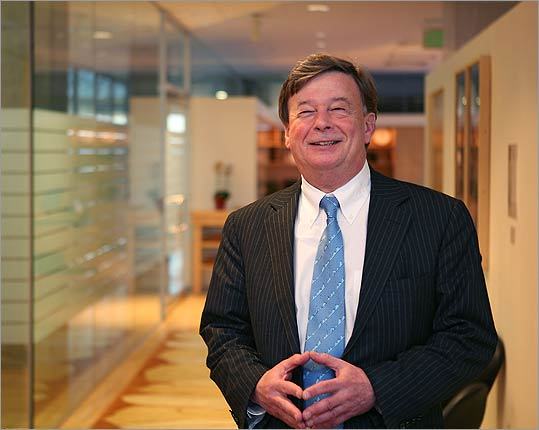 (Photograph by Donald Rockhead)
(Photograph by Donald Rockhead)
Going out on top
As Genzyme is sold, its longtime CEO reflects on building – and leaving – a biotech pioneer.
 (Photograph by Donald Rockhead)
(Photograph by Donald Rockhead)
In 1983, we had the beginnings of the biotechnology industry. One day I got a call to visit whatever it was at Genzyme. And it was, of course, not much. It had the right ingredients. I liked that the direction hadn’t been really established. It was an open book. I could go where I wanted to go. I gave up my job, gave up half my income, and moved here. It was a shot in the dark, and it was magnificent.
Genzyme was just these professors from MIT and myself and some venture capitalists. We met every Saturday, sometimes every Saturday and Sunday, to establish what we could do that others weren’t doing.
Every industrialized thing you can visualize, we thought of and tried: how to produce an enzyme that would get more oil out of the ground, how to make hair curl, how to clean drainpipes. These were serious thoughts in the early ’80s. There’s an enormous step to say, “I [will] take the technology to make a new drug to treat something.”
Some of my friends would visit me and say: “He’s lost it. This is going to be such a disappointment after a while.” Today, when we recall the experiences, they say, “You were crazy.” It was just pretty much a dream, and today you can walk around Boston and Cambridge and find these dreams all over the place.
We were working on an enzyme to treat Gaucher disease. It’s a horrifying disease. We did a human experiment, and the patient, a 3-year-old boy, benefited enormously. That was a remarkable moment. We learned the power of doing something that really works. It taught us that you can do incredible things if they are worthwhile. You can overcome deep hurdles or skepticism. We built the backbone of our culture. Today, he’s a happy father with three kids, and he’s doing fine.
We can’t say as a society, “We can’t afford to think through the solution for you.” But the solution, no doubt, is very expensive. So companies need to have the encouragement to continue to invest. That return has to be high on the few successes that you have. We never had returns that were outrageous. We always invested continuously in therapies for new diseases. We have some pretty important new therapies ahead of us, like for multiple sclerosis. Fantastic prospect. We failed miserably many times. But we succeeded many times, too.
When somebody became interested [in buying Genzyme], in this case Sanofi-Aventis SA, it was an opportunity for our shareholders to look at our value and an opportunity for us to test that value. And Sanofi is clearly interested in us because of what we do and who we are, not in taking our products off the shelf and moving on. It’s a good thing for the community.
I am 65. I had already announced a year ago that I looked at 2011 as a transition year. It’s not about me. I will stay close to what’s happening here, but I need to get out of the way, because this organization needs to find its future without me. I will absolutely stay involved in this kind of work. There’s nothing more powerful than being associated with a program that can truly change the direction of disease – when you look a patient in the eye and say, “We have something that may help.”
We created a very successful company that’s not going to disappear, that will continue to grow. We created [a company worth], minimally, $20 billion-plus. I feel identified with some of that. I’m not a manager; I didn’t take care of an existing asset. I created value. So I don’t feel tremendously sensitive [on receiving as much as $221 million after the sale]. But I completely accept that these numbers are high. It’s just the way it worked out after 30 years.
I’m a little older now, and maybe wiser. The things that I valued [in 1983] I value today. I’m enormously grateful for having had this experience. My confidence in the future grew over those years.
Today, I feel you can have an expectation to do things, although lots of people – really wise people – will tell you it may not work. They’re very often right. But you stay persistent. You get the right people around you. This is a really great community to continue to do important things. I think all of us have a responsibility to use it.
Scott Helman is a Globe Magazine staff writer. Send comments to magazine@globe.com. This interview was condensed and edited.![]()






